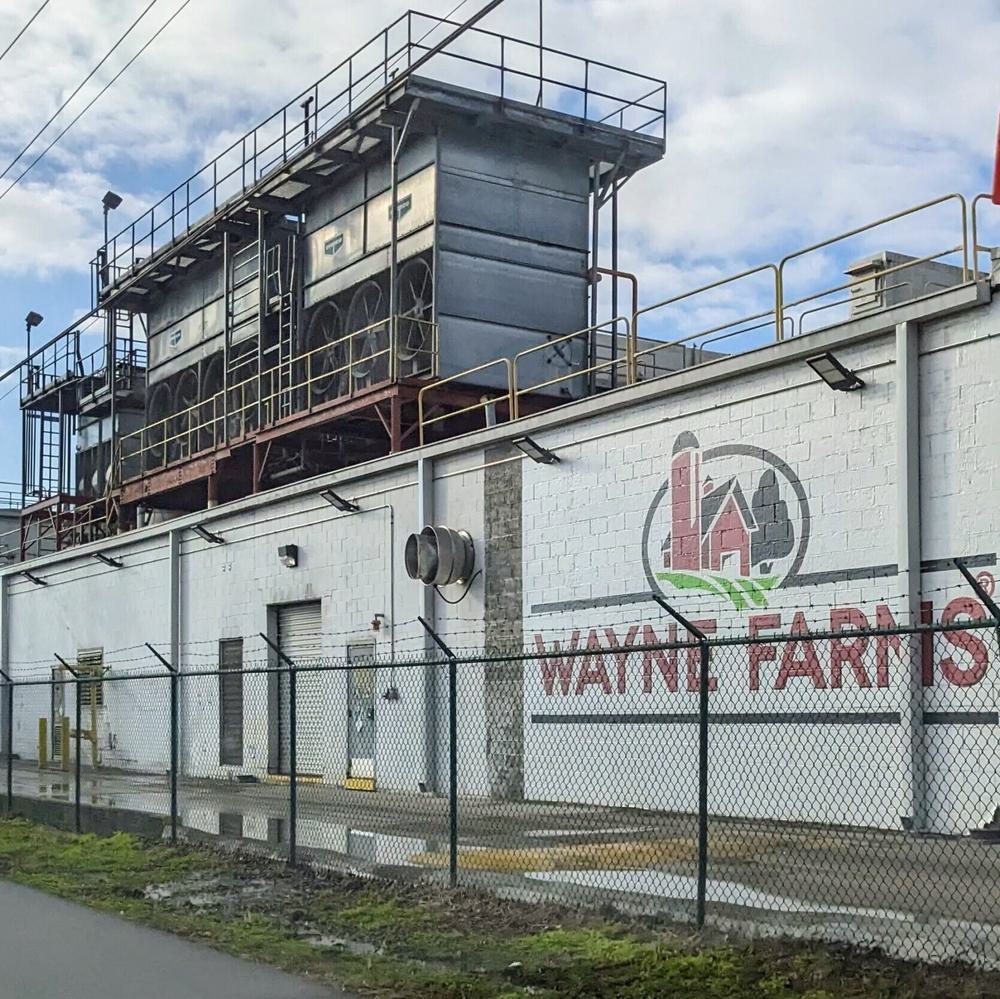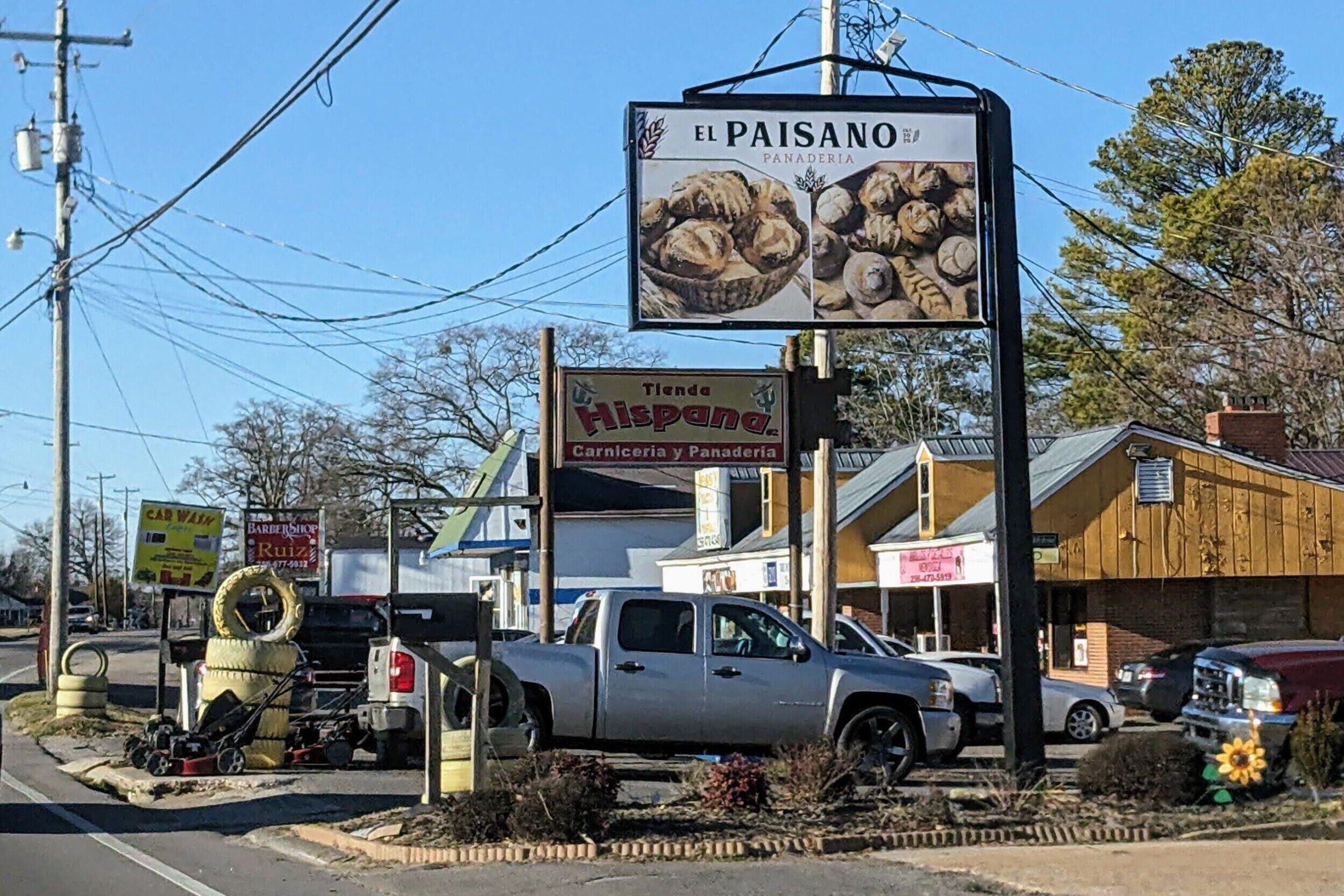ALBERTVILLE — It's more than a 1,000-mile drive from the U.S.-Mexico border to Albertville, yet the small city known for its fire hydrants and chicken processors has become the face of immigration, legal or otherwise.
To see how the Latino immigrant population has impacted the predominantly white, working-class community, one needs to look no further than an area known affectionately by some locals as "Little Mexico."
It encompasses a strip of Hispanic-owned auto dealers, mechanics, bakeries, restaurants, barbershops and supermarkets bearing Spanish names along Alabama Highway 205, just a short drive from downtown Albertville and its city hall, county courthouse and old brick buildings typical of many small towns in Alabama.
According to U.S. Census data, Alberville's Hispanic population was virtually nonexistent in 1990, with just 77 reported out of the total population of roughly 14,500. That began to change in the mid-1990s when many immigrants flocked to the city, most seeking work at the Wayne Farms poultry processing plant near the town's high school.

By 2010, nearly one out of every four Albertville residents was Hispanic, as the population ballooned to over 6,000 out of 21,160. The most recent Census data for 2020 showed the Hispanic population still around 28.7%, though other sources estimated it could be as high as 33.7%.
According to the 2023 federal report card, Hispanics made up almost 57% of Albertville City Schools' student body, and 29.4% of students had limited English proficiency. Those numbers grew from 41.6 % and 12.4%, respectively, since 2015.
With such a significant increase in Hispanics in a short period, Albertville became ground zero for the national immigration debate, capturing the attention of state and federal lawmakers and prominent corporate news media.
Former U.S. Sen. Jeff Sessions made Albertville part of his push for immigration reform and closing the border under then-President Donald Trump. Former State Sen. Scott Beason pointed to Albertville in his House Bill 56 — which was referred to by many as the strictest immigration bill in the nation — as an example of how illegal immigration was negatively impacting Alabama.
"It was kind of the hotbed in Alabama, where a lot of the illegal aliens were moving to," Beason told 1819 News. "...It was having a real impact on schools and healthcare and everything else."
Local historian and museum board member Danny Maltbie, who lived near the poultry plant, said he witnessed immigration enforcement officers raid the poultry plant on multiple occasions.
"I can remember seeing immigration officers sitting back up in those woods [from across the plant] watching the gate where they go in and out of," he said. "And at that time, there would be busses that would show up there and load folks up and take them back across the border. But I haven't seen that since the 90s."
Despite the Immigration Reform and Control Act of 1986 prohibiting the hiring of known criminal immigrants, many were able to get jobs at Wayne Farms using fake identification. Thanks to the E-Verify worker eligibility database, Wayne Farms spokesman Frank Singleton said that's no longer an issue.

"Wayne Sanderson Farms has a diverse workforce, including Latino employees. Our employees are hired from local applicants who provide proper identification and documentation proving they are authorized to work in the U.S.," Singleton told 1819 News in a statement. "As one of the original E-Verify users and one of the federal government's 'pilot program' operators since the 1990s, we employ every tool available, including those provided by federal and state agencies, to prevent the hiring of unauthorized workers. We continuously train H.R. team members involved in reviewing IDs, I-9s and required documentation. The majority of our employees are hired through local applications and undergo our effective H.R. screening process prior to hire."
Maltbie said the reaction of residents at the time of the migrant influx was mixed, depending on who you asked. Even as poultry workers and other locals befriended the new Hispanic population, the broader issue of illegal immigration with its criminal side effects and tax burden remained a sticking point.
As a city council member at the time, Jeanie Courington acted as an unofficial liaison for the burgeoning immigrant community. She had many Hispanic friends who helped her see things from their perspective.
She helped organize a march in 2006 to protest immigration reform and ran for mayor in 2008 with a message of embracing the Hispanic community.

"My feeling at that time these people are here to stay," she said. "We need to embrace them and bridge the gap, and teach them our rules and regulations and how we did things."
She continued, "We still have, unfortunately, a gap of acceptance, I think. And we still have not done a good job of educating them into what we feel like is the rights and the wrongs of our community. Even though we're years down the road, some things have changed, but some things have not. I don't know that it ever will."
Prominent resident Teresa Ferguson described the 1990s as "Mayberry and the third-world colliding." She was one of the first residents in the area to link the increase in drug crimes, prostitution and strain on school resources to the rise of illegal immigrants, and she played a major role in attracting Sessions' and Beason's attention.
She told 1819 News of a conversation she had with Sessions about him helping her Chinese daughter-in-law enter the United States.
"I was talking to him, and I said, 'It really would be a lot easier if I just flew her to Mexico and brought her in the back of a pickup truck,'" she said. "I was just joking with him, and the look on his face was like I had slapped him because this was so early on that everybody was not aware of all this and us being such a magnet."
Ferguson formed a group of concerned business owners, city leaders and teachers to help organize and address the illegal immigration issue. She began giving state lawmakers tours of Albertville to show them areas worst impacted and eventually landed an audience with then-President Trump during his 2016 campaign.
"I told him, you don't have to do anything extra, just enforce the laws that are on the books," she said. "It's not that hard, and nobody wants to do it."
Ferguson was unsure if things in Albertville had gotten worse since HB56 was struck down, and even though Trump, if he retakes the White House in 2024, has promised to deport the criminal immigrants who have entered the United States under the Biden administration, she said: "There's no way to turn the clock back."
Sources show that Alabama's illegal immigrant population has hovered around 60,000 over the last decade, peaking at 90,000 during the Obama administration. However, since that state can't enforce federal immigration laws, the only way to track criminal migrants is when they have run-ins with local law enforcement.
Albertville Police Chief J.T. "Butch" Cartee has encountered many illegal immigrants during his 36 years in law enforcement. He said many things have improved in the local community, at least regarding public acceptance, as many migrants now have full-citizen children and have started their own businesses.
"A lot of folks have been here long enough to understand our laws," he said. "That was the biggest thing. They didn't understand how it was done here."
Cartee told of a time years ago when an immigrant offered him a bribe during a traffic stop.
"He goes, 'How much, how much?' And I was like, what do you mean?" Cartee said. "Then I began to realize he was like, 'How much is it going to cost me, dude?' And I found out later that in Mexico, it's a common practice… I said, 'It doesn't work that way here.'"
Former APD officer Jason Keeton, who worked undercover on the narcotics unit, said drugs become a more prominent issue as Mexican cartels moved in along with the flood of migrants. He said he went from finding a couple of grams of meth during a traffic stop to seizing several pounds at a time years later before he retired in 2018. He said the cartel remains a big promoter of the drug trade in Albertville.
"It's not what you see on TV," he said. "It's low-key. They're not going to advertise."
Marshall County Sheriff Phil Sims has also seen an uptick in drug trafficking and illegal immigration; however, he said most of the migrants making their way to Albertville and the surrounding area "don't cause trouble" aside from a few "bad apples."
He said President Joe Biden's lax border policy hasn't made things any easier when it comes to cracking down on narcotics.
"The thing about the drugs, once the border is open, the drugs are going to come through just like the people do," he said. "With it being as wide open as it is, drugs come through easier, they make their way here easier, and yes, some of the bad apples will bring the drugs into this area."
Sims said Kilpatrick, an area not far from Albertville where Marshall, DeKalb and Etowah County intersect, has long been a known hot spot for drug trafficking.
The other major issue his office has been dealing with lately, he said, was tracking unaccompanied immigrant minors who have been placed in sponsor homes after crossing the southern border.
"I've learned that we have a fairly sizeable amount of those that have come here in the northeast, particularly the Marshall County/DeKalb areas," he said. "We are working to address that issue. Once they come here or wherever they go, there's no checks and balances to make sure these kids are taken care of, that they're where they're supposed to be, the welfare of these children. There's nobody checking up on them. DHR's not checking on them. Nobody knows they're here as far as the state level, the county level."
Sims said he wanted to help these children, most of whom are here illegally because not doing so could lead to them being trafficked.
Like the APD, Sims said the sheriff's office can't enforce federal immigration laws, but they can notify federal immigration enforcement of an issue if they arrest a suspect on another charge. He said they are able to check via a fingerprint search if a suspect has been deported before or has other immigration-related charges.
Recently, the flow of Latino immigrants has given way to migrants from other countries, primarily Haitians seeking asylum. Maltbie said, like the Hispanics in the 1990s, many Haitians came to work at Wayne Farms or one of the other chicken plants to help fill jobs after many Hispanics left the area or didn't show up for work when HB56 was passed.
Courington, now the city's recycling coordinator, said she didn't think it was fair the ease with which Haitians could move in versus what the Hispanics went through.
"They're here on an asylum [claim], so they get all the rights and privileges everybody has," Courington said. "Yet the Hispanic population that comes here, it takes years to have your work privileges and be an American citizen, and thousands and thousands and thousands of dollars. To me, that's almost a discrimination in itself on that end. But that's just the government; not anything we can do about it."
From his view of Wayne Farms, Maltbie said he's seeing more and more Haitians walk to work, something he had never seen until recently. He had nothing but positive things to say about the Haitians he'd met, but he still worried about the growing population's strain on the city's infrastructure.
"Our infrastructure is getting past the breaking point," he said. "The population is growing quicker than our infrastructure: our roads, and traffic and what have you."
Alabama's federal delegation, both in the U.S. House and Senate, have been vocal about the illegal immigration crisis at the southern border and its impacts on the country.
Alabama Attorney General Steve Marshall, who hails from nearby Guntersville, has also condemned Biden's "dangerous immigration policies," which he blamed for an illegal alien, who was to be deported after sodomizing a 13-year-old boy in Marshall County, being able to make it back into the county where he was arrested after being seen with children at a local store.
SEE: Tuberville: Biden, Mayorkas 'should be locked up'
"Joe Biden has done more to exacerbate the immigration problem than any president before him," Marshall told 1819 News. "This administration's goal, from Day 1, has been to fundamentally alter the makeup of America. Biden's hope is that the number of illegal immigrants here will become so immeasurable, and stopping it so insurmountable, that Republicans will have to give in to widespread amnesty. But he's wrong—it's simply not what the American people want. It is the main reason, among many, that Joe Biden should be removed from the White House later this year."
Marshall County voted overwhelmingly for Trump in 2020 as he promised to close the border and build a wall. Immigration remains one of the top issues for voters in the 2024 presidential election, and Republicans aren't the only ones complaining about the porous border.
Recently the liberal mayors of New York City and Chicago have both bemoaned the influx of migrants arriving on their streets from Texas, straning their resources. If large, well-funded cities are hurting to accommodate what equates to a less than 2% increase in their immigrant population, small cities like Albertville could face an uncertain future if current trends continue.
To connect with the story's author or comment, email daniel.taylor@1819news.com or find him on Twitter and Facebook.
Don't miss out! Subscribe to our newsletter and get our top stories every weekday morning.










